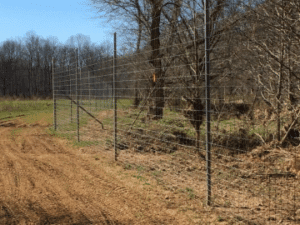 It doesn’t matter if you have one or 100 heads of cattle, the fencing you use to keep them safe and sound matters more than you might think. When buying game fence for your agricultural operation, you want to look at several factors, including needed maintenance, potential longevity, performance, and cost.
It doesn’t matter if you have one or 100 heads of cattle, the fencing you use to keep them safe and sound matters more than you might think. When buying game fence for your agricultural operation, you want to look at several factors, including needed maintenance, potential longevity, performance, and cost.
For August and September’s posts, we’ll offer insight into the different types of fencing material most commonly used on a cattle ranch.
Barbed Wire
While barbed wire is one of the most common fencing materials in the United States, it’s neither the most cost-effective nor the best. Barbed wire is outdated, dangerous, and actually comes with a higher price tag than you might expect. Although it’s been used for more than a century and a half, there are better options, especially if you don’t want to spend much of your time and money on maintenance.
When it comes to performance, barbed wire falls short. That is because sharp barbs can seriously damage both people and animals. And, if you have horses, they are at a higher risk of injuries when trying to walk through barbs, which they may not see. Barbed wire is also exceedingly easy to breach and is also not an appealing option for future buyers.
In the world of game fencing, barbed wire is also considered to have a low life span, with a maximum expectation of around 15 years in ideal conditions.
Field Fence
Field fence is similar to barbed wire and is also not the best game fence option for your cattle. Field fencing does have one benefit over barbed wire, and that is that it is made with tighter, more closely woven strands, which makes it more difficult for other large animals, such as sheep, horses, and pigs, to become entangled.
To get an idea of the performance of a typical field fence, spend an afternoon looking at an existing structure. Even at just a few years old, field fencing gets warped and weak and can succumb to weathering, rust, and pressure. Furthermore, if you’re looking to keep out feral hogs, a field fence’s inherent weakness means you’ll soon be looking for another material anyway.
Field fence is also another short-live game fence option and even comes in with a less impressive life expectancy than barbed wire, around 10 years. Both barbed wire and field fencing require routine maintenance, including tightening and replacing worn and rusted sections.
So, what is the best game fence option for cattle? The answer is high-tensile fixed-knot wire. Follow our blog next month for why.
Straight Shooter Game Fencing offers agricultural and high fencing to property owners throughout Alabama, Tennessee, North Carolina, Virginia, Louisiana, Georgia, Mississippi, North Carolina, and Florida.
